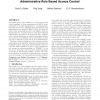Free Online Productivity Tools
i2Speak
i2Symbol
i2OCR
iTex2Img
iWeb2Print
iWeb2Shot
i2Type
iPdf2Split
iPdf2Merge
i2Bopomofo
i2Arabic
i2Style
i2Image
i2PDF
iLatex2Rtf
Sci2ools
124
click to vote
SACMAT
2009
ACM
2009
ACM
Symbolic reachability analysis for parameterized administrative role based access control
Role based access control (RBAC) is a widely used access control paradigm. In large organizations, the RBAC policy is managed by multiple administrators. An administrative role based access control (ARBAC) policy specifies how each administrator may change the RBAC policy. It is often difficult to fully understand the effect of an ARBAC policy by simple inspection, because sequences of changes by different administrators may interact in unexpected ways. ARBAC policy analysis algorithms can help by answering questions, such as user-role reachability, which asks whether a given user can be assigned to given roles by given administrators. Allowing roles and permissions to have parameters significantly enhances the scalability, flexibility, and expressiveness of ARBAC policies. This paper defines PARBAC, which extends the classic ARBAC97 model to support parameters, and presents an analysis algorithm for PARBAC. To the best of our knowledge, this is the first analysis algorithm sp...
Related Content
| Added | 28 May 2010 |
| Updated | 28 May 2010 |
| Type | Conference |
| Year | 2009 |
| Where | SACMAT |
| Authors | Scott D. Stoller, Ping Yang, Mikhail I. Gofman, C. R. Ramakrishnan |
Comments (0)

